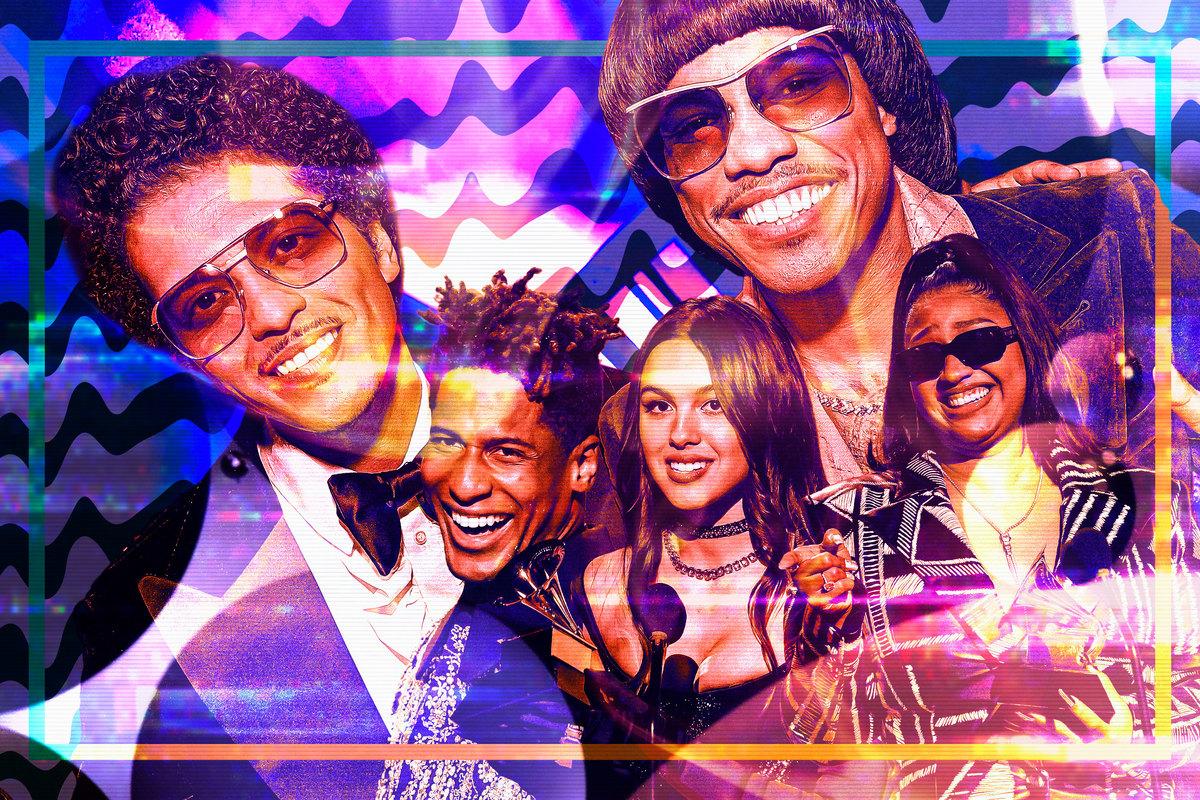
The 64th-annual Grammys were held on Sunday, and after a week in which Oscars drama dominated the discourse, the music awards’ relative calm was a welcome break. But that’s not to say that they didn’t have their share of good, bad, and WTF moments. How did Olivia Rodrigo and Billie Eilish both lose Album of the Year to Jon Batiste? Why is BTS always the bridesmaid? And how did Doja Cat make it back from the bathroom in time to collect her award? Let’s break down all this—plus the rest of the winners and losers from the ceremony.
Winner: Familiarity
Headed into the evening, Olivia Rodrigo was the betting favorite or cofavorite for the Big Four awards: Best New Artist, plus album, song, and record of the year. Her pole position was much deserved: Olivia was the biggest new thing in the music industry last year, and likely the biggest new act since Billie Eilish released her debut album in 2019. There was talk of a Rodrigo sweep, which would’ve made her the third artist in history (alongside Eilish and, umm, Christopher Cross) to win all four major awards in one night. With seven overall nominations, the prospect of an Eilish-style photo op—with Rodrigo juggling an unreasonable amount of Grammy Awards backstage—seemed possible, if not likely.
But then it came time to give out the awards. While Rodrigo cleaned up in the smaller categories, winning Best Pop Vocal Album and Best Pop Solo Performance, she won only one of the Big Four: Best New Artist (an award for which she had no real competition). Record and song both went to Silk Sonic for their Delfonics cosplay “Leave the Door Open,” while AOTY went to Late Show bandleader/Soul co-composer Jon Batiste, who was one of the most nominated artists in history this year, with 11. (He won four.) Despite the Rodrigo hype, the Silk Sonic wins made a certain amount of sense: Bruno Mars and Anderson .Paak are peak Grammys bait, have now performed at the ceremony for two consecutive years, and peddle in the type of retro soul the Academy loves to reward. Batiste is more confounding. His We Are joins a list of unexpected winners that includes Steely Dan’s Two Against Nature and Beck’s Morning Phase, both of which emerged from a field of more popular, more influential projects. Beck and the Dan at least had the benefit of being legendary artists in their field. Batiste—seemingly a nice man and definitely a talented musician—doesn’t exactly fit that mold. In fact, We Are could be the least-listened-to Album of the Year winner in decades. (Its most popular song, “Freedom,” had just 9.1 million streams on Spotify as of Sunday night, while Rodrigo has two with more than 1.3 billion.)
But while Rodrigo had the momentum plus a project that grabbed millions of listeners across several generations, We Are is filled with the kind of aspirational, spiritually uplifting easy-listening soul that the Recording Academy tends to favor. And faced with the choice between one of the more exciting new pop artists of the past few years and the same old, the Academy went with the latter. It should serve as a reminder that with the Grammys, the familiar will almost always win out, even if it feels unfamiliar to you.
Loser: Populism
For the first time in ceremony history, the four major categories had 10 nominees each. The Academy presumably made the move in response to last year’s Weeknd debacle, when the singer was shut out of the nominations for his stratospherically popular single “Blinding Lights” and album After Hours. The announcement of the expanded field was not without some controversy, however: The decision came just 24 hours before the nominations were announced in November, and it benefited performers like Kanye West and Taylor Swift, two massively popular artists who sneaked into the Album of the Year category as a result. So while Recording Academy CEO Harvey Mason Jr. told The New York Times that his organization wanted “to embrace the spirit of inclusion,” it’s hard not to read the decision as an attempt to get more household names in the running for the prime-time awards.
Fast-forward to Sunday: Despite the gesture toward populism, Batiste took home the night’s biggest prize. It’s possible that he would’ve won the award regardless, but it’s certainly plausible—if not likely—that Rodrigo, Billie Eilish, and Taylor Swift split enough to pave the way for Batiste’s victory. The results may have been entirely different had voters not had to contend with all three. (It should be noted that despite a task force’s recommendation in 2019, the Grammys have yet to adopt a ranked-choice ballot.)
If the Grammys’ efforts to get more popular artists involved did indeed backfire, then it’s time to cue the Kent Brockman quote.
Winner: Pee Breaks
Awards shows can often feel canned: The performances are perfectly choreographed, the bits are rehearsed, and the drama is virtually nonexistent. It’s part of what made last Sunday’s Oscars so shocking and just a little bit thrilling. While the Grammys didn’t have anything to rival the Slap, it did have one beautiful organic moment: Doja Cat running back from the bathroom to accept the award for Best Pop Duo/Group Performance alongside SZA. “I’ve never taken such a fast piss in my whole life,” she said after she got on stage. It got even better from there.
The emotional speech has a layer of added meaning because of Doja’s comments last week that she was planning to quit music. Her brief time in the spotlight hasn’t been without controversy, but pop music is better with her in it. Here’s hoping that the award helps cause her to stick around. But no rush—we can let her handle whatever she needs to first.
Tie-er: Ties
Seemingly every year when an NFL game ends in a draw, a player says after the game something to the effect of, “I didn’t realize there could be ties.” Which makes sense, as ties are exceedingly rare in pro football (though after last season’s Week 18 tilt between the Raiders and Chargers famously almost came to one, everyone may be a lot more aware of their possibility now).
Here’s where we admit that we had no idea that a Grammys race could end in a tie. Yet, that’s just what happened on Sunday, as two categories had cowinners. In Best R&B Performance, Silk Sonic and Jazmine Sullivan split honors, while the music for Soul and The Queen’s Gambit shared the award for Best Score Soundtrack for Visual Media. It would’ve perhaps been more shocking had the two categories been given out in the main ceremony instead of the preshow. (Despite seeming like a rare occurrence, draws have happened 30 times in the ceremony’s history—most recently in 2020, when Marc Anthony and Aymée Nuviola split Best Tropical Latin Album.)
How can this happen? There are thousands of members in the Recording Academy, so while voters are limited in how many categories they’re allowed to vote in, the prospect of two nominees getting the exact same tally should be virtually impossible. We suppose a tie is better than a coin flip or some other arcane tiebreaker deciding who walks away with a statue—there is no strength of schedule in music, after all—but maybe the Recording Academy should take a cue from the NFL and look for a more equitable solution to close contests.
Bittersweet Winner: Foo Fighters
Nine days after the death of longtime drummer Taylor Hawkins, Foo Fighters won three awards in the preshow ceremony: Best Rock Performance, Best Rock Song, and Best Rock Album. The band wasn’t on hand to accept the statues, as they announced earlier this week they’d be pulling out of a scheduled performance on Sunday and canceling their remaining tour dates. But the Recording Academy made sure Hawkins’s presence was felt during the main show: Before the in memoriam montage—itself a moving tribute to composer Stephen Sondheim—a short video dedicated to Hawkins played. It was set to the Foo Fighters classic “My Hero.”
The most moving dedication to Hawkins came earlier in the night, however. Early in the show, Billie Eilish took the stage wearing a Hawkins T-shirt as she belted out her soaring hit “Happier Than Ever.” It was a powerful performance, complete with an artificial downpour that amplified the emotions of the song and the moment. But most importantly, it was a tribute worthy of a hero like Hawkins
Winner: The DJ Drama Industry Redemption Story
By the late 2000s, DJ Drama had established himself as one of the most important moguls in music through his Gangsta Grillz mixtapes, an industry-upending series that produced a torrent of influential projects, from the tapes that launched Jeezy’s and T.I.’s careers to the ones that gave Lil Wayne the battery in his back for his Best Rapper Alive run, among many others. However, Drama operated in the gray area that most mixtapes at the time did: without the blessing of the major labels, even though those companies often benefited from them immensely. In 2007, those labels decided to stop looking the other way. Federal agents raided his Atlanta studios, confiscated 80,000 CDs, arrested Drama and fellow mixtape icon Don Cannon, and filed RICO charges against them. Nobody back then would’ve envisioned a day when Drama would be recognized by major industry players in an official setting.
But thanks to Tyler, the Creator, we can now call DJ Drama a Grammy Award winner. On Sunday, Tyler collected his second Grammy in three years for Best Rap Album, this time for 2021’s excellent Call Me If You Get Lost. After the alt-pop master class of 2019’s IGOR, Call Me represented a return to Tyler’s rap roots—and to do so, he enlisted Drama to revive the Gangsta Grillz series. Across 16 tracks, Drama shouts ad-libs and beautiful one-liners like: “We on a yacht, a young lady just fed me French vanilla ice cream.” It was a fascinating aesthetic choice and a reminder of Gangsta Grillz’s undying influence. (Tyler was all of 16 years old when Drama was arrested.) Drama doesn’t hold the same tastemaking status that he once did, but 15 years after his lowest professional moment, the same industry that shunned him has fully embraced him.
Loser: The Notion of “Cancel Culture”
When the 2022 Grammy nominations were announced, two names jumped out immediately for the wrong reasons: Marilyn Manson, who was nominated twice for his work alongside Kanye West, and Louis C.K., who received a nod for Best Comedy Album. Both men have been the subject of disturbing accounts of their behavior in recent years. To date, 16 women have said that Manson—real name Brian Warner—sexually abused them, and four have sued him. Louis C.K., meanwhile, apologized in 2017 after several women said he sexually harassed them, including instances of forcing them to watch him masturbate. But when the Recording Academy received backlash for nominating both men in November, Academy CEO Mason defended the decision, saying, “We won’t look at people’s history,” while adding, “What we will control is our stages, our shows, our events, our red carpet.”
On Sunday, Louis C.K. won his category—marking his first major award since 2017. And while Manson was eventually dropped as a nominee for his work on Kanye West’s “Jail”—a “procedural” update, a source previously told The Hollywood Reporter—the song still won the award for Best Rap Song at this year’s ceremony. The Academy may not want to look at people’s history, but at least on Sunday, it spilled over to what happened on its stage.
Winners in Defeat: BTS
2022 marked the second straight year that the Grammys has given the biggest K-pop band a nomination and invited them to perform—and presumably bring along their massive fan base—and it also marked the second straight year that BTS went home empty-handed. While the organizers of the ceremony aren’t—or at least shouldn’t be—responsible for what the voting body decides, at a certain point, it becomes insulting. I can’t frame it any better than Elle magazine did in a headline earlier Sunday: “BTS Deserves a Grammy, but Do the Grammys Deserve BTS?”
While the answer to that is open to debate, what’s not is BTS’s performance on Sunday, which was an early-show highlight, if not the evening’s best performance, full stop. While some acts took the Las Vegas setting in the wrong direction—take Nas’s soft launch for a residency somewhere on the strip, for example—the Bangtan Boys went full Ocean’s 11 in their stage time, reenacting a museum heist and pirouetting among laser beams as they performed their megahit “Butter.” (And that’s before acknowledging V’s flirtations with Olivia Rodrigo at the beginning.)
Every few years, we debate who should be the next James Bond. Should it be Diddy? Idris Elba? James Norton? Watching BTS on Sunday, I wondered: What if it were V? Or better yet, all seven of the guys? Based on that performance, I’m convinced they could probably pull it off. They may even enjoy it more than winning a Grammy.
Winner: Jasmine Sullivan’s Sunglasses
Sullivan’s Heaux Tales was a (much-deserved) upset winner in the Best R&B Album category, beating Grammy darlings H.E.R., Leon Bridges, and Batiste. She seemed as shocked as we all did, and in accepting the award, she delivered one of the more emotional speeches of the night. But damned if she didn’t look slick as hell in those shades.
On a night when Justin Bieber’s stylist stopped making sense, Sullivan’s deserves a shout-out.
Loser: Anyone Hoping for Oscars-Level Drama
Host Trevor Noah set the tone for this year’s ceremony early: In his opening monologue, after running through a handful of groaners about Finneas’s last name and Olivia Rodrigo’s driver’s license, he told the crowd, “We’ll be keeping people’s names out of our mouth.” And despite Noah’s ability to poke those in power—his recent targets have notably included Kanye West—he played it straight on Sunday. The most controversial thing that happened was a cringe-worthy aside Noah shared with BTS. And the closest anyone got to referencing the Will Smith–Chris Rock incident again came when Questlove—the award recipient whom Rock was presenting amid the fateful slap last Sunday—said that he hoped that everyone would stay “500 feet away from me.” After a week in which people could talk about little else besides Smith’s Oscars meltdown, the Grammys had little interest in indulging.
By and large, the 2022 Grammys represented a return to normalcy—not only following the Academy Awards, but after the pandemic led to a stripped-down, intimate ceremony in 2021. Sunday’s show was essentially a 180 from last year’s. The MGM setting gave the proceedings a feeling of bombast, and most performers acted accordingly. (None more so than future White Men Can’t Jump reboot star Jack Harlow, who joined Lil Nas X’s performance to let, uh, his mic hang.) And while the ceremony yielded no truly viral moments—though shout-out to the censor, who had to work overtime during Justin Bieber’s “Peaches”—it was largely a success, and a welcome reprieve from The Discourse that followed the Oscars.
In other words: If the most controversial thing your ceremony does is give an award to a slightly-less-popular musician than the one we expected to win, that’s perfectly OK. We weren’t expecting anything less, anyway.

